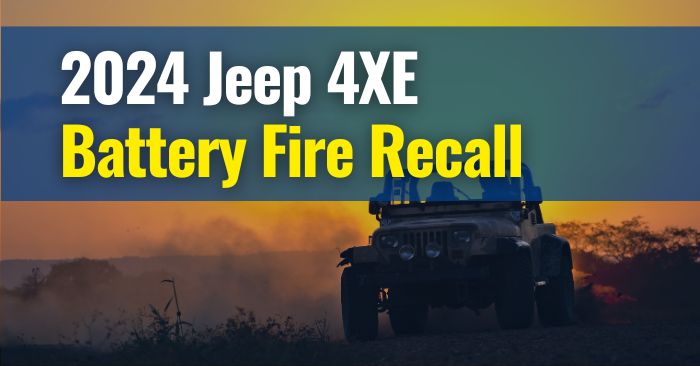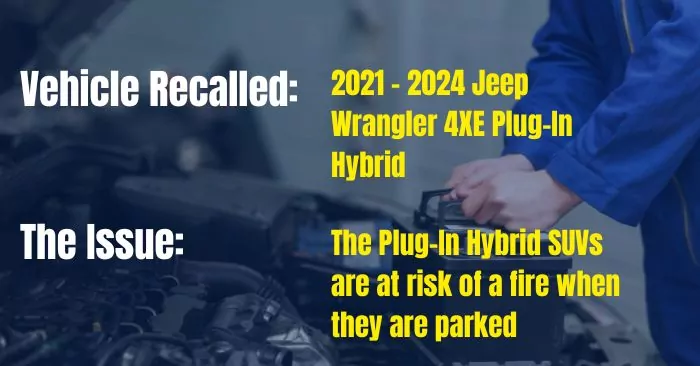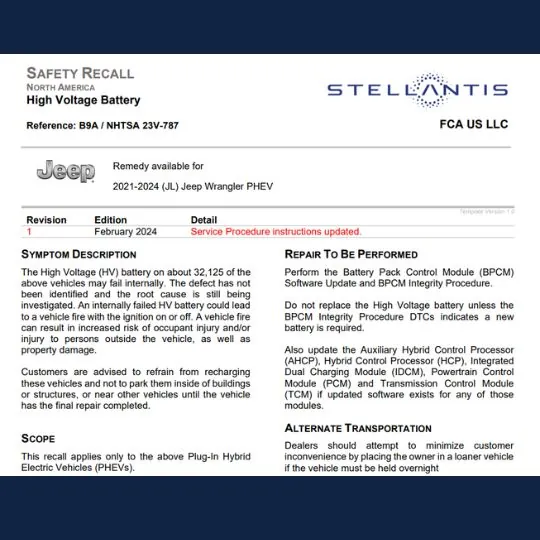
Written By: Jessica Anvar Stotz
Legally Reviewed By: Jessica Anvar Stotz

In November 2023, Stellantis issued a recall affecting over 32,000 Jeep Wrangler 4XE plug-in hybrid SUVs. The recall covers the 2021 through 2024 model years due to an increased risk of vehicle fire.
The automaker advised affected drivers to temporarily park these vehicles away from structures and outside until the necessary fixes are implemented.
Stellantis, in an official statement, stated owners can drive the affected vehicles but strongly discourages recharging until any recall-related repairs are applied.
The recall comes in response to eight reported fires involving parked vehicles, with six of them occurring while the Wrangler 4XE was connected to electric chargers.
If you have had battery issues in your Jeep Wrangler 4xe you could be qualified to receive a refund or cash compensation through the Lemon Law in California.
| Affected Vehicle | |
| 2021 Jeep Wrangler 4xe | $87,154 |
| 2022 Jeep Wrangler 4xe | $97,758 |
| 2023 Jeep Wrangler 4xe | $102,751 |
*Please note, the figures presented in the chart are approximations based on past case results and should not be interpreted as a prediction or guarantee. Each case is unique and requires personalized legal guidance.
Stellantis says that only 1 percent of the recalled vehicles may have this issue. The automaker asserts that no crashes or injuries have been reported due to this defect.
What is Causing This Jeep Recall?
According to Jeep, Certain Wrangler 4XE plug-in hybrid electric vehicles manufactured between 2021 and 2023 may encounter an internal failure in their high-voltage battery. The battery in question is manufactured by Samsung SDI. The specific nature of their defect is yet to be determined, and investigations are currently underway to identify its root cause.
The identification of potentially affected units relies on the examination of supplier manufacturing records for HV batteries containing cells produced within the specified timeframe of January 21st, 2021, through October 2nd, 2021.
| Vehicles Recalled | 2021 to 2024 Jeep Wrangler 4XE Plug-In Hybrid |
| The Issue | The plug-in hybrids SUVs are at risk of a fire when the vehicle is parked. Possessing a threat to buildings and individuals around it |
| The Repair | The remedy involves a software flash. If a certain error code is compromised, the battery pack will be replaced free of charge. |
| The Cost | Complimentary if the vehicle has been affected by recall |
| NHSTA Information | 23V787 |
| Jeep Recall Number | 89A |
| How To Contact Jeep | Owners may call Jeep at 1-800-853-1403 |

How Can I Check if My Vehicle is Affected?
Check the NHSTA for recalls
The NHSTA allows you to retrieve recall information specific to your vehicle by inputting your vehicles 17-digit Vehicle Identification Number (VIN) on their website. We highly recommend using their recall check website to look for any open recalls affecting your vehicle regularly, especially if you own a 2020 or newer model.
Keep an eye out for recall notices
Recall notification letters are owners were sent to affected drivers starting January 11th, 2024.
If you have experienced any battery-related issues in your Jeep Wrangler, you should consult with an authorized Jeep servicing dealership. Professional guidance helps ensure that you get an accurate diagnosis of the problem and offers recommendations on the essential repairs or actions needed.
What Should I Do if My Vehicle is Affected?
If your Jeep Wrangler was recalled for battery issues, follow FCA’s instructions in refraining from parking your car indoors or near flammable structures until you complete recall repairs. As a possible remedy, FCA is offering a fix in the form of a software update.
As part of recall-related repairs in the 2023 recall, dealers were instructed to conduct a complimentary update on the high-voltage battery pack software and, if deemed necessary, replace the battery pack assembly free of charge.
If you need additional assistance in scheduling recall repairs, you can contact FCA US, LLC customer service at 1-800-853-1403. The assigned recall number for FCA US, LLC in this instance is 89A.
How do you fix the Jeep Battery Problem?
FCA is offering a fix for the battery fire issue in the form of a vehicle software update. Dealerships will also replace any defective battery components if necessary.
Jeep Wrangler 4XE Class Action Lawsuit
In early June, a California resident who leased a 2021 Jeep Wrangler Unlimited 4XE initiated a Jeep hybrid class action lawsuit against FCA/Stellantis. The plaintiff asserts that the battery is “unreasonably dangerous and defective,” posing a major health risk.
The class action claims that both the plaintiff and other Jeep Wrangler 4xe owners had reported battery issues, but Chrysler allegedly refused to address the problem despite being aware of its prevalence. The lawsuit also contends that the plaintiff and other customers were unfairly charged for cabin filter changes, which should have been covered under the Manufacturer’s warranty.
Earlier this year, a group of consumers filed a similar class action lawsuit against FCA, alleging that the 2021-2023 Jeep Wrangler 4xe plug-in hybrid electric vehicles were sold with defective hybrid propulsion systems that could lead to fires and explosions.
Filed on March 4 in the U.S. District Court for the Eastern District of Michigan, this complaint represents plaintiffs from Arizona, California, Florida, New Jersey, North Carolina, Pennsylvania, and Texas. It names FCA, LLC (Chrysler) as the defendant and seeks class action status to secure damages for all buyers and lessees of 2021-2023 Jeep Wrangler 4xe vehicles with electric batteries.
The plaintiffs note that in November 2023, FCA issued a recall for the Jeep Wrangler 4xe, warning owners that the plug-in hybrid electric vehicle (PHEV) battery might fail. The National Highway Traffic Safety Administration (NHTSA) advised affected drivers not to recharge the battery and to park their vehicles outside and away from structures until all recall-related repairs could be completed
Plaintiffs in the suit claim that FCA did not identify the root cause or provide a definitive solution to the defect. As a result, consumers were left with potentially dangerous vehicles that they could not use normally.
The Jeep Wrangler class action lawsuit asserts that FCA has yet to offer a repair or resolution for the battery fire issues. Owners claim they were sold vehicles that are unsafe to drive or park near their homes. The complaint also highlights that owners have not been informed about safe distances for parking their vehicles or what to do if they lack a safe parking location.

Should I Join a Jeep 4xe Class Action Lawsuit?
If your Jeep Wrangler 4XE is experiencing persistent issues or requires repeated repairs, you might have a valid lemon law claim against FCA. Lemon laws protect consumers who have purchased or leased vehicles that are repeatedly repaired for the same or similar issues during the warranty period. If your Jeep has persistent problems and you have experienced repeat warranty repair attempts, you may be entitled to a refund or a replacement vehicle under the Lemon Law.
Pursuing an individual lemon law claim is typically more beneficial than joining a class action lawsuit. Individual claims are tailored to the consumer’s specific situation, and you won’t have to share the settlement with potentially thousands of other claimants. Auto manufacturers typically aim to minimize payouts in class action suits, and your share of a class action settlement might not even cover all your repair expenses.
With both the refund and replacement remedies, the manufacturer is entitled to charge the consumer a usage fee, which is a value for when the consumer drove the vehicle without problems that lead it to being a lemon.
Contact The Lemon Law Experts
Auto companies like Chrysler typically hire top-notch legal teams. If you’re facing one of these manufacturers alone, you’ll need the best legal representation available. For California residents, the Lemon Law Experts offer some of the finest legal assistance.
Since 2009, the Lemon Law Experts have secured millions of dollars in compensation for lemon law claimants across the state. Regardless of the manufacturer, the Lemon Law Experts can advocate for your best interests to ensure you receive the recovery and justice you deserve.
Have any questions about a Jeep or other vehicle? Contact the Lemon Law Experts today for a complimentary and obligation-free consultation. Our dedicated team of lemon law professionals is committed to ensuring that our clients obtain justice. To learn more, contact us at or visit our website today.
Citations
The sources cited follow rigorous guidelines to ensure they come from trustworthy and reliable sources, including official government documents, reputable news outlets, legal records, and expert analyses.
National Highway Traffic Safety Administration. (2023). Recall Report 23V787. Retrieved from https://static.nhtsa.gov/odi/rcl/2023/RCLRPT-23V787-2073.PDF
Hudson, T. (2023, October 10). Jeep Wrangler 4xe Fire Risk Prompts Recall of 2021-2024 Models. Retrieved from https://www.caranddriver.com/news/a45989119/jeep-wrangler-4xe-fire-risk-recall-2021-2024/
Top Class Actions. (2023, September 21). Jeep Class Action Alleges Wrangler Unlimited 4xe Has Serious Battery System Defect. Retrieved from https://topclassactions.com/lawsuit-settlements/lawsuit-news/fca-class-action-lawsuit-and-settlement-news/jeep-class-action-alleges-wrangler-unlimited-4xe-has-serious-battery-system-defect/
CarComplaints.com. (2024, February 5). Jeep Wrangler 4xe Battery Fires Lead to Class Action Lawsuit. Retrieved from https://www.carcomplaints.com/news/2024/jeep-wrangler-4xe-battery-fires-class-action-lawsuit.shtml
Superior Court of the State of California for the County of Los Angeles. (2024, March 4). Complaint Demand for Jury Trial. Retrieved from https://www.aboutlawsuits.com/wp-content/uploads/2024-03-04-Complaint.pdf




